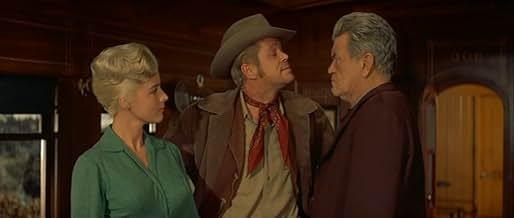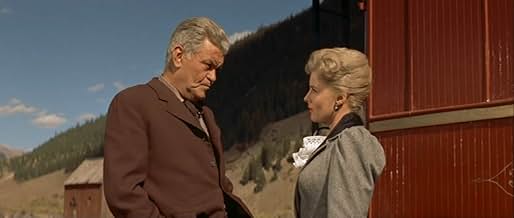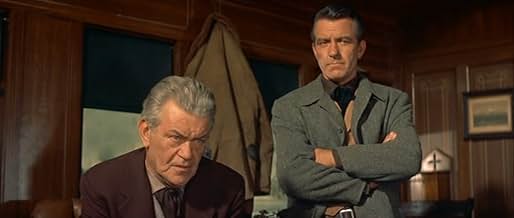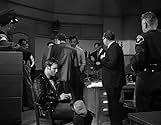Jay C. Flippen(1899-1971)
- Actor
- Writer
- Soundtrack
Jay C. Flippen could probably be characterized these days as one of those craggy, distinctive faces you know but whose name escapes you while viewing scores of old 1950s and 1960s films and television series. Playing both sides of the law throughout his career, his huge cranium, distinctive bulldog mug, beetle brows, bulky features, usually scowling countenance, and silver-white hair were ideally suited for roles as criminals and rugged adventurers, while his background as a standup comedian in burlesque, vaudeville and minstrel shows.
He was born John Constantine Flippen on March 6, 1899, in Little Rock, Arkansas. His father, John (a bookkeeper), died in 1908. Flippen's older sister, Era, died a year later (in 1909). His mother, Emma L. Flippen (née Pack), earned an income as a dance and theatre instructor. His maternal grandmother, Mary Pack, lived with the family. Picking up on his mother's artistic interests, Flippen joined the Al G. Field Minstrels at age 16. He was discovered by African-American star comedian Bert Williams in the 1920s, and was Williams' Broadway black face understudy and tour replacement for the 1920 musical revue "Broadway Brevities". Between 1924-29, he recorded scores of songs for Pathé Columbia, Perfect, and Brunswick Records. A veteran radio announcer for Yankee baseball games, Flippen was a lifelong baseball fan who forged friendships with several major league baseball stars. He also appeared on Broadway throughout the mid-1920s (and after), including "June Days" (1925), "Hello, Lola" (1926), "The Great Temptation" (1926), "Padlocks of 1927" (1927), "Second Little Show" (1930), the musical "Hellzapoppin'" (1941), and "Take a Bow" (1944).
Flippen made his film debut in the short The Ham What Am (1928), which captured a vaudeville performance, followed by a few other early 1930's shorts. He didn't move strongly into feature films until post-World War II where he could be counted on to provide his patented gruff and bluster in primarily war stories, film noir, and westerns whether playing a sheriff, farmer, cop, prison warden, military high-ranker or bartender. After playing Hodges, a guard, in Brute Force (1947), he appeared in such other crime yarns as Intrigue (1947), They Live by Night (1948), A Woman's Secret (1949), The Las Vegas Story (1952), The Wild One (1953), The Killing (1956), The Midnight Story (1957), Studs Lonigan (1960) and, The Seven Minutes (1971). His also dominated in such westerns as The Lady from Texas (1951), Devil's Canyon (1953), Man Without a Star (1955), Oklahoma! (1955) (as Ike Skidmore), The Restless Breed (1957), Run of the Arrow (1957), The Deerslayer (1957), From Hell to Texas (1958), and The Plunderers (1960).
Flippen supported many a top Hollywood male star during his four-decade film career. His atmospheric characters notably supported James Stewart in several of his top-notch vehicles, including Winchester '73 (1950), Bend of the River (1952), Thunder Bay (1953), The Far Country (1954), Strategic Air Command (1955), The Restless Breed (1957), Night Passage (1957), and Firecreek (1968). He was a regular player on 1960s television as well, including Bonanza (1959), The Untouchables (1959), The Dick Van Dyke Show (1961), Route 66 (1960), Burke's Law (1963), Gunsmoke (1955), Rawhide (1959), That Girl (1966), and The Name of the Game (1968). He also co-starred as an Chief Petty Officer in Ensign O'Toole (1962).
In later years, Flippen was dogged by illness. While filming his sheriff role in the classic comedy western Cat Ballou (1965), he had to have his leg amputated after a minor scrape, probably aggravated by diabetes, turned into a severe infection. He continued his career often in a wheelchair. His latest television roles were on episodes of The Virginian (1962), Here Come the Brides (1968), and Ironside (1967).
He was born John Constantine Flippen on March 6, 1899, in Little Rock, Arkansas. His father, John (a bookkeeper), died in 1908. Flippen's older sister, Era, died a year later (in 1909). His mother, Emma L. Flippen (née Pack), earned an income as a dance and theatre instructor. His maternal grandmother, Mary Pack, lived with the family. Picking up on his mother's artistic interests, Flippen joined the Al G. Field Minstrels at age 16. He was discovered by African-American star comedian Bert Williams in the 1920s, and was Williams' Broadway black face understudy and tour replacement for the 1920 musical revue "Broadway Brevities". Between 1924-29, he recorded scores of songs for Pathé Columbia, Perfect, and Brunswick Records. A veteran radio announcer for Yankee baseball games, Flippen was a lifelong baseball fan who forged friendships with several major league baseball stars. He also appeared on Broadway throughout the mid-1920s (and after), including "June Days" (1925), "Hello, Lola" (1926), "The Great Temptation" (1926), "Padlocks of 1927" (1927), "Second Little Show" (1930), the musical "Hellzapoppin'" (1941), and "Take a Bow" (1944).
Flippen made his film debut in the short The Ham What Am (1928), which captured a vaudeville performance, followed by a few other early 1930's shorts. He didn't move strongly into feature films until post-World War II where he could be counted on to provide his patented gruff and bluster in primarily war stories, film noir, and westerns whether playing a sheriff, farmer, cop, prison warden, military high-ranker or bartender. After playing Hodges, a guard, in Brute Force (1947), he appeared in such other crime yarns as Intrigue (1947), They Live by Night (1948), A Woman's Secret (1949), The Las Vegas Story (1952), The Wild One (1953), The Killing (1956), The Midnight Story (1957), Studs Lonigan (1960) and, The Seven Minutes (1971). His also dominated in such westerns as The Lady from Texas (1951), Devil's Canyon (1953), Man Without a Star (1955), Oklahoma! (1955) (as Ike Skidmore), The Restless Breed (1957), Run of the Arrow (1957), The Deerslayer (1957), From Hell to Texas (1958), and The Plunderers (1960).
Flippen supported many a top Hollywood male star during his four-decade film career. His atmospheric characters notably supported James Stewart in several of his top-notch vehicles, including Winchester '73 (1950), Bend of the River (1952), Thunder Bay (1953), The Far Country (1954), Strategic Air Command (1955), The Restless Breed (1957), Night Passage (1957), and Firecreek (1968). He was a regular player on 1960s television as well, including Bonanza (1959), The Untouchables (1959), The Dick Van Dyke Show (1961), Route 66 (1960), Burke's Law (1963), Gunsmoke (1955), Rawhide (1959), That Girl (1966), and The Name of the Game (1968). He also co-starred as an Chief Petty Officer in Ensign O'Toole (1962).
In later years, Flippen was dogged by illness. While filming his sheriff role in the classic comedy western Cat Ballou (1965), he had to have his leg amputated after a minor scrape, probably aggravated by diabetes, turned into a severe infection. He continued his career often in a wheelchair. His latest television roles were on episodes of The Virginian (1962), Here Come the Brides (1968), and Ironside (1967).




































